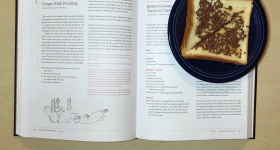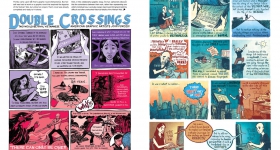I am used to sharing living spaces. Growing up I always shared a bedroom, and in my early years even a bed, with my brother; sometimes sleeping in the same room with my parents. Throughout college I shared too-small dorms and cheap apartments with friends and strangers alike, learning to navigate private spaces turned communal. Being forced to live in homes that were always too cramped, even if they weren’t necessarily small, I soon realized that physical space often becomes intertwined with psychological space.
Sandra Park dissects the idea of space in her novella If You Live in a Small House: the space of the individual, of the family, of the community, and of the nation. Following the lives of a multigenerational Korean American family, she captures the nuanced tensions between characters forced to live together in a too-small house, each one wishing for something more.
“Although Father and Gloria did not get along, the days and years unfurled with few visible disagreements,” Park writes, and the suggestion of invisible disagreements plays a central role throughout the book. She focuses, instead, on things left unsaid. Though they share a house, the characters rarely share words. In contrast to their cramped quarters, they live isolated in their thoughts and desires. Father, a WWII veteran, longs for the Italian woman he wooed abroad, while Gloria, the unwed sister-in-law, mumbles silently to herself about romance.
The state of Hawaii becomes an important landmark, a symbol of the complex themes of isolation. Although, as Park writes, “An island in the middle of the ocean is a small world,” Hawaii is implicated in the cultural and political atmosphere of America. Though physically separate from the mainland, Hawaii is still infiltrated by American radio and television, an inversion in a sense of the relationships between the family members who, though physically close together, are mentally distant.

author Sandra Park
Furthermore, set in the 1940s-1950s, the book also examines the remnants of war in Hawaii and, especially, its impact on Asian Americans. Recently returned from WWII, Father worries about the possibility of son Ezra being drafted in the Korean War. “Why Korea?” the adults ask each other after the children have gone to bed. “The most pitiful stories were about mistaken identity, the problem of the wrong face and the right uniform.” The conflict between American patriotism and postwar exhaustion is further complicated by the fact of having a “Japanese face.”
Much like the characters in a Virginia Woolf novel, haunted by memories of WWI, Park’s characters exist as ghosts, drifting past each other without comprehending. “As in most crowded homes, people learned how to draw the shade, looking and seeing nothing.” Even as Ezra boards a plane to California years later as a grown man, he “[looks] like a stranger to his family.” Those who live in the present are blind to each other, living in their own isolation. “The dead never get tired of sitting in one place; without a wall separating them from others, they can take it easy, humming familiar tunes,” Park writes, capturing the ennui of her characters who are only interested in their own desires, their memories of the past and aspirations for the future. For them, the present is not enough.
Rather than write a plot-driven narrative, Park instead chooses to give us vignettes to explore the psychologies of her characters. Mirroring their emotional isolation from each other, the chapters are distinct moments arching not only across characters but also across time, dipping back to Father’s memories of WWII, forward to the onset of the Korean War. Done by a less skilled writer, this literary decision could come across as disjointed and clumsy. Park is successful, by centering the writing on individual characters and their own histories, at creating not necessarily a story in the traditional sense, but sketches of her characters’ internal monologues and external interactions. She gives us enough to understand their restless longing, but leaves out enough to keep us itching for more.
Eric Zhang has a background in Asian American studies, art, and visual culture. He currently lives in New York, where he works at NYU and MOCA.









Comments